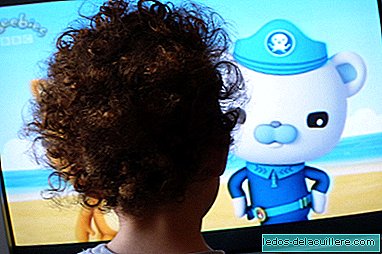
Aric Sigman is a psychologist and writer from the United Kingdom who has recently published an article in the Archives of Disease in Childhood. In it he states that Nowadays children spend more time watching television than at school, adding that this large amount of time in front of the screen is a risk factor for some diseases over time (such as obesity and cardiovascular problems).
But Sigman doesn't just talk about television, because the average number of screens in homes in Britain is five, also taking into account that in many houses children also have television in the rooms, well in fact that also happens in Spain.
Part of the scientific community in the United Kingdom criticizes this expert for his claims, claiming that the studies lack the necessary rigor, but I think the main point is that parents should not need any study in this regard. Let's see, if they tell me that a British teenager spends six hours between screens (a figure that does not differ much from what happens in Spain) and an American one eight, I don't need any report to realize that 'something is happening', and of course I know how to deduce by myself that very healthy is not. Moreover, our own experience and that of the people close to us should be worth it, to assess the consequences of improper use (by time or content) of television. For example if after watching three hours of television a child becomes enraged when we turn it off, or if friends go to his house to look for him to play in the street and he prefers to continue sticking to the screen (although the chapter has already seen), you may have a problem.
What happens when children watch too much television?
I think that parents should have more autonomy, both from the studies (which are very good if they act only as a guide) and from the trends that are the ones that often drive us to let the children abuse consoles and television programming. We have the command (in real and metaphorical sense), and we are the ones who decide.
In most European countries there are many children (between two and 10 years old) who are seeing an average of five hours a day, and without going to the possible physical consequences, common sense is enough to understand that interpersonal relationships, physical activity, reading and more often than desired, studies are left aside.
Sigman (which we must consider despite the fact that he is not given rigor) is not the only one who warns about the inappropriate uses of the screens, since a few years ago various investigations are already warning us of how harmful television can be If it looks out of control or for many hours.
The American Academy of Pediatrics ensures that the time children spend in front of television should be limited to no more than one or two hours a day of "quality programs", and the TVs should not be placed in their rooms
Dr. Gwen Wurm, assistant professor of pediatrics at the University of Miami School of Medicine, warns of the danger of television becoming a substitute for human relationships. And points out that in no case should children under two years of age see it.
This expert relates the frequent and abusive viewing of television content with obesity problems, lack of concentration in even with a deficient development of the cognitive process.
The solution is to exercise parental functions
In case anyone needs recommendations, we will say that:
The children must watch television accompanied by their parents, who will also select and control the contents (quality children's programming, informative programs, documentaries ...)
TV is viewed with a critical spirit, because that is how we transmit the values to children without teaching and we give them a basis to develop their own criteria.
The children they should not watch more than two hours a day of television on the days allowed, which would be on weekends. On weekdays the use of television (unless it is limited to 'ok, you can see this chapter') is inappropriate.
The television is not used while we eat, or to help them sleep, nor just awakened 'to have breakfast without squealing'.
It is better that the television set is in a common place in the house such as the dining room, and that children do not have it in their room.
The more possibilities they have to interact with the environment without relying on television (sports, outdoor games, shopping with parents, library visits, etc.) The healthier the growth of children will be.












